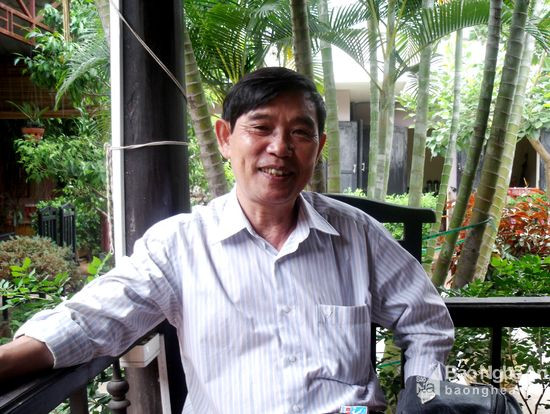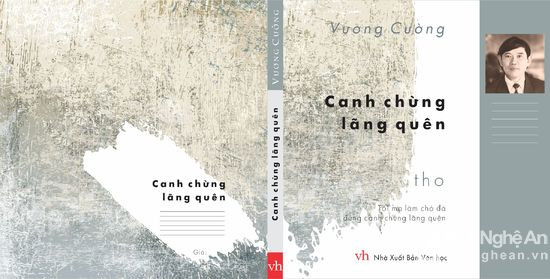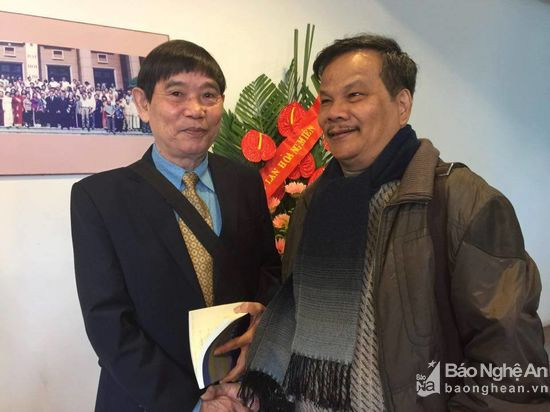Vuong Cuong - the man 'haunted by poetry'
(Baonghean) – 'If I could give up poetry, I would have given up poetry a long time ago. But that is impossible. You could say, I am haunted by poetry'
Poet Vuong Cuong was recently admitted to the Vietnam Writers Association in 2017. Many people jokingly said that he was forgotten by the Writers Association (because he wrote poetry very early, many of which were very good and even considered to be less popular than him in the post-war poetry category) just as he was overshadowed by his older brother: poet Thach Quy.
Vuong Cuong laughed heartily… He said, with poetry, no shadow can cover another shadow, the poet must make his own lonely journey, creating separately and differently. It is innate, a need, a self-urge. And if he could give up poetry, he would have given up poetry a long time ago. But that is impossible. “You could say, I am haunted by poetry.”
"In the past, when people in my hometown met, they only talked about poetry and literature."
Born in 1949, in Dong Bich village, Trung Son commune, Do Luong district, poet Vuong Cuong is the younger brother of poet Thach Quy (Vuong Dinh Huan), and nephew of poet Vuong Trong.
He is proud of his famous Vuong family, which has 3 members of the Vietnam Writers Association, and in addition, there are "countless" poets and writers, who have produced a thick and quality collection of poems by writers in the family.
Vuong Cuong is also proud of his hometown, the village with Quy mountain with countless rocks and wildflowers, whose name became the pen name of a famous poet from Nghe An.
Vuong Cuong said that in the old days, in his village, and in his Vuong family, people often talked about literature and poetry. “Whenever we opened our eyes, we were talking about literature. But my family is very strange. When we met, we only talked about poetry and prose. I don’t remember ever talking about business. Maybe because they spent all year round working in the fields, or working far away, so when they met, they wanted to talk about more noble things?”
Then he continued: “I still remember the cultural nights in the old village, people read poetry, performed plays, we didn’t want to leave even though I was very young. At that time, there were even great poets from the central government coming to read poetry on the village stage.
After reading, I almost memorized all of them. I memorized all the new poems, not from books, because in those days there were no books to teach new poems, I memorized them by eavesdropping on my uncles and brothers talking and reciting poems to each other.
I also memorized the poem “Homeland” by To Huu from the voice of my uncle Vuong Tram. Until now, in my mind I still remember that sound, the color of the sunlight, the lush green garden that day, the bewilderment of a teenage boy when he touched the vibrations of poetry.
 |
| Poet Vuong Cuong. Photo: PV |
Vuong Cuong has another thing to be proud of, that is, he was born and raised by the “most wonderful women in the world”. That is his grandmother and mother. The people who passed on to him love, taught him how to behave in life, and gave him respect for life and people.
While his grandmother had tirelessly told him stories of the past day after day, his mother told him stories of the present day. His mother was illiterate, but her life was profound and delicate, "few women could match her".
She never said a harsh word to her children. “If you are wise, speak far, if you are foolish, speak near”, that is the motto of life, and also the motto of raising children of this woman from Dong Bich village. Perhaps, the maturity and depth of this mother has more or less influenced the personality as well as the literary imprint of her children?
The "country soul collector"
The beauty of the homeland and its people has become a nostalgia and a love that is nailed in the souls of the poets of Dong Bich village. As for the poet Thach Quy, someone once said that he “loved his homeland to the point of being rigid and stubborn”, and he chose his homeland to stay with for the rest of his life even though the opportunity to travel was extremely open to him.
For Vuong Cuong, even though he has been away from home for decades, his love for his homeland is even more "extreme".
Vuong Cuong said that, for some reason, as if it were his own flesh and blood, he loved every tree and dike in the village. When he was in 8th grade, he had to transfer to Thanh Chuong, having to be away from home for a few days a week, and the nostalgia for his hometown made him absent-minded.
“I am like a person with a travel addiction. No matter what I do or where I go, my soul wants to fly back to that place. Every time I return, from afar, seeing the bamboo clump of Dong Bich village, I feel like shaking and sobbing.”
On his Facebook, I read quite a few stories about the countryside in Vuong Cuong’s memories. Among them, there is a story that I particularly like, he told to his “childhood friend”, Mr. Lan, a buffalo herder in the countryside who is now 99 years old:
“In fact, he was a buffalo herding friend of most of the villagers. Those aged from 10 to nearly 100 today were his friends. I was his friend from the late 50s to the mid-60s. At that time, I was in the village. Later, due to studying far away and the war, I was temporarily unable to herd buffalo with him. As for him, he still herded buffalo or cows with other friends of different ages.
Although we have been apart for nearly half a century, when we meet again, the topic of herding buffalo and cows between “us” is still the main topic, always lively. He recounts the times we took the buffaloes together to eat junk food, with someone watching us closely. We fed the buffaloes in the restricted area of Con Pheo, the police were lying in wait, crawling in the mud of Bau Buoi, covering our heads with grass, leaving only our eyes, like special forces…”.
Because of his wholehearted love, Vuong Cuong could not stop regretting that the spirit of his homeland was now… drifting further and further away. He was saddened by the “loss of his homeland”. But “homeland creates beauty, reduces indifference, reduces cruelty”.
Then he thought: “Evil people cannot write literature. Literature does not accept evil people. Preserving the soul is therefore very important.” And he considered himself a scavenger, picking up what was left to cultivate for himself the “country soul” that still lingered somewhere.
“Beware of forgetting”
“Watching for Oblivion” is the name of a poetry collection published in 2016 by Vuong Cuong. It also partly reflects the “quality” of this poet. Vuong Cuong has a very important field of poetry, especially wartime and post-war poetry.
 |
| Cover of the poetry collection Watching for Forgetting by poet Vuong Cuong. Photo: PV |
At the age of 19, Vuong Cuong entered the University of Construction and at the age of 23 he joined the army, fought for 81 days and nights in Quang Tri Citadel, then went to liberate the South, until the end of the war, he returned to study at the University of Construction in 1976.
In 1979, he studied at the Central Propaganda School, in 1987 he was a graduate student at the Academy of Politics, then a lecturer, Deputy Head of the Department of Science Management, Ho Chi Minh National Academy of Politics.
Having spent a long time on fierce battlefields, Vuong Cuong wrote very well, very deeply about soldiers. Poet Nguyen Trong Tao, in the preface to the poetry collection “Watching Over Forgetting” by Vuong Cuong, wrote:
No one gave him the burden of emotional wounds, but Vuong Cuong voluntarily carried it until the end. His poems are full of war wounds, even though the grass has turned green, he still cannot forget the “bloody laughter”, the “wounded/sparkling verses”... It is not only the war that has passed but never left him, but it is also another war about the pride and remorse of those who are still alive.
Indeed, Vuong Cuong’s poems repeatedly mention sacrifices, living souls, cemeteries and ghosts that always dig deep into the poet’s soul. “I dream”, “Carrying you out”, “Sleeping at night in Truong Son cemetery”, “Writing at Van Dien cemetery”, “Those eyes still look at me”, “Village ghosts”… and especially the poem “The person who died twice has not yet completed his journey” are all unique poetic lines that are powerful in moving and anchoring the human soul.
For someone born in the peaceful Dong Bich village, raised by lullabies and teachings filled with love and care from his grandmother and mother, and holding a gun to fight to protect the peace of his homeland, it is not easy to forget the blood and tears of his people and comrades.
Until now, the poet still “dreams”: The soul smoke has gone/ I wake up in the realm of nothingness./ Oh ancient citadel, every day I lose one hundred and fifty friends/ eighty-one floors of fire and flower towers./ Now you, the young grass, sing about the future/ now you, the underground museum, lull./ I dream of becoming a stone dog/ standing guard over oblivion…”
Poetry is a lonely creative journey, it must be different.
As a famous lecturer at the National Academy of Politics, with a PhD in theory and many scientific research works, Vuong Cuong "has never left poetry".
He wrote poetry since primary school, had poems published in Central newspapers very early, won second prize in the poetry contest in Tuoi Tre newspaper in 1981 for 4 poems: Behind and in front, I brought back for you, Difficult things to say, When I hold your hand... but it feels like he only visited the poetry scene for a bit of fun, not seriously attached to it.
But surprisingly, Vuong Cuong is a person who loves and cares a lot about poetry. Even during the fifteen years when he almost did not write poetry (only 3 or 4 poems as he said), he still could not stop thinking about it. Vuong Cuong said, he "didn't write easily".
 |
| Poet Vuong Cuong with poet Tran Quang Quy. Photo: PV |
“Maybe I’m picky, but I think poetry has to be different. If you wrote like me, there wouldn’t be any more poets. Each poet has to take their own creative path to poetry. That’s why I don’t like rhymed poetry or “formulaic” poetry.
I advocate poetry without rhyme but with melody as the basis. I know what I say will be somewhat offensive, but that is my point of view. And I always struggle to find my “way”.
Vuong Cuong also said that he has not and will never set the goal of using poetry to “feed” himself. “It is okay to sacrifice for it, but do not rely on it to feed you” is his attitude towards poetry.
Talking about the current state of poetry, Vuong Cuong said that Vietnamese poetry is still in a "mess". To change and differentiate, four important factors are needed: the era, a team of new pioneering poets, a team of influential critics, and a team of good readers.
He also admitted that writing poetry was a struggle. Therefore, “if I could give up poetry, I would have given it up a long time ago, but I am someone who is haunted by it and cannot stop.” Is that why “the last part of my life was tied to the Writers’ Association?”
Poet Vuong Cuong, member of the Vietnam Writers Association
Published: Song in Search of Someone (Culture Publishing House, 1997); The Cloud in the Shape of a Young Woman (Literature Publishing House, 2010); Watching for Oblivion (Writer Association Publishing House, 2016)
Prepare to print: Wave your hand out into infinity (theoretical research workbook)
Urbanization and some socio-economic issues (research)
Thuy Vinh
| RELATED NEWS |
|---|
